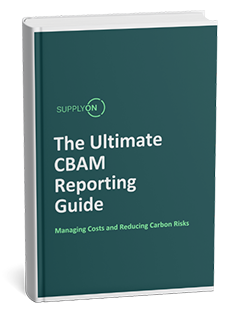CBAM Reporting: How to prepare with primary data requirements from July

The Carbon Border Adjustment Mechanism (CBAM) is a key element of the European Union’s climate strategy. Its goal is to stop carbon leakage and make sure EU industries stay competitive. CBAM, which is based on Regulation (EU) 2023/956, levies a carbon price on imported goods that corresponds to the price applicable in the EU under the Emissions Trading Scheme (ETS) to ensure a “level playing field” for goods produced inside and outside the EU. To comply with regulations and assess financial impact, companies need accurate carbon reporting. It’s essential for businesses to understand the difference between using default values and primary data for this reporting.
Urgency to Collect Accurate Primary Data
As the sole use of default values is only permitted until June 30, 2024, it is crucial for companies to start collecting accurate primary data now to ensure compliance for the July-September reporting period. The transition to primary data reporting is not only a regulatory requirement but also a strategic necessity to maintain competitive advantage and avoid potential financial and operational setbacks.
Consequences of Failing to Collect Accurate Data:
- Regulatory Penalties: Non-compliance with CBAM reporting requirements can result in substantial fines and penalties. Reporting declarants may face penalties ranging between €10 and €50 per ton of unreported incorrect emissions. Higher penalties can be applied when more than two incomplete or incorrect reports have been submitted or the duration of the failure to report exceeds 6 months.
- Increased Costs: Inaccurate reporting due to reliance on default values can lead to overestimation of emissions. An overestimation in the full implementation period will require the purchase of more CBAM certificates than necessary, significantly increasing compliance costs.
- Reputational Damage: Failing to comply with CBAM regulations can harm a company’s reputation, affecting stakeholder trust and market positioning.
- Operational Disruptions: Last-minute efforts to gather primary data can cause significant operational disruptions, diverting resources from core business activities.
Understanding CBAM Reporting
CBAM aims to make sure EU-produced goods and imports are on an even playing field by equalizing carbon costs. This prevents companies from moving their production to countries with less stringent emissions regulations. Initially, CBAM targets the emission-intensive sectors iron and steel, cement, fertilizers, aluminum, hydrogen and electricity. The rollout started with a transitional period from October 2023 to the end of 2025 and then shifts to a definitive phase in January 2026.
Accurate carbon reporting is crucial for both compliance and efficiency under CBAM. It impacts the purchasing of CBAM certificates, which in turn affects a company’s financial liability and competitive position. Precise reporting helps avoid penalties and strengthens a company’s sustainability credentials.
Differences Between Default Values and Primary Data in CBAM Reporting

Challenges with EU’s Communication Template
Many companies initially attempt to use the EU’s communication template to collect primary data for CBAM reporting. While this template is intended to standardize data collection, it often leads to significant challenges and failures:
- Complex to Understand and Difficult to Use: The EU’s template can be complex and not user-friendly, making it difficult for users to navigate and input data correctly.
- Lack of Indication of Data Plausibility: There is no plausibility check for the supplier-provided data and whether the emissions values are too high or too low, which can lead to inaccurate reporting.
- Unstructured Data Collection: The template does not facilitate structured data collection from all relevant installation sites, leading to fragmented and inconsistent data.
- Limited Bulk Operations: The template is not designed to send to multiple suppliers at once, nor does it easily allow for tracking of responses or sending reminders for corrections, which complicates the data collection process.
- Time-Consuming Manual Data Entry: The template requires extensive manual data entry, which can be time-consuming and prone to errors, increasing the risk of inaccurate data submission.
SupplyOn’s CBAM Reporting Manager
SupplyOn’s CBAM Reporting Manager is designed to overcome these challenges and simplify the standardized data collection process to support your journey to CBAM compliance, ensuring companies can efficiently transition from default values to primary data reporting with minimal effort.
Key Features that You need for October Reporting:
– Automated Data Collection: CBAM Reporting Manager automates the collection of emissions data across various stages of the supply chain including operators and installation sites, reducing manual efforts and ensuring data accuracy.
– Collection of Mandatory Data Possibility: The software offers the option to collect and report only mandatory CBAM data to reduce the effort on both sides, importers and their suppliers.
– Bulk Data Collection: With just few clicks you can now collect data from all relevant operators and their installation sites at once.
– Plausibility Indicator: The software has plausibility database integrated to immediately check the collected supplier CBAM data where they are too high or too low.
– One click CBAM Report: The reporting panel makes it incredibly easy to check and create quarterly “XML” CBAM report just with a single click which are ready to submit to EU Transitional Registry.
What you should consider for July-September Reporting Period:
Transitioning from default values to primary data for CBAM reporting presents significant challenges for companies, but it is necessary for accurate compliance and financial efficiency in long term. SupplyOn’s CBAM Reporting Manager provides a robust solution, simplifying the data collection process and supporting your reporting journey with minimal effort.



